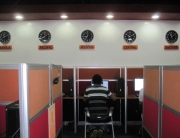Metro Manila now in Jones Lang Lasalle’s top 30 investment cities globally | BusinessMirror.
GLOBAL real estate and investment management firm Jones Lang Lasalle (JLL) announced on Thursday that Metro Manila is now recognized as one of its Top 30 Real Estate Investment Cities in the world.
Jeremy Kelly, director of JLL Global Research, said during the Asia Real Estate Summit 2015 in Makati City that the Philippine economy’s robust growth is crucial in making Manila one of the most attractive commercial real-estate spots today.
He listed economic output, population, corporate presence, connectivity, real-estate stocks and investment as some of the criteria that JLL considered in its Global City Commercial Attraction Index in real estate and development.
“The key feature of a successful city is about sustainable momentum, adaptability and ability to reinvent itself. Manila definitely has these qualities,” Kelly said in his presentation.
JLL predicted that by 2030, Manila will be top 18 in the world in terms of city gross domestic
product (GDP), having one of the highest economic momentum globally, along with Jakarta and Istanbul.
Kelly also mentioned the Philippines’s specialization in the business- process outsourcing (BPO) sector as one of its strengths in the global city competitiveness scale. He cited AT Kearney Emerging Cities Outlook 2014 and Tholons Top Outsourcing Destinations in 2015, both placing Manila in the No. 2 spot.
“The Philippines should leverage its position as a BPO destination so that it can evolve fundamentally into a technology hub,” Kelly added.
The city’s population and demographics also play a big role in the city’s success, as it is one of the densest cities in the world. Kelly said Manila is on its way to becoming a supersized city, reaching 30 million people by 2030.
“This will shape endless possibilities and pathways to future developments. Interestingly, many cities around the world are looking at densification as the answer to some of their challenges,” he said. It also provides the city with a huge work force and numerous talents.
JLL also named other factors in a city’s competitiveness, namely, transparency, consistency, business friendliness, livability, sustainability, innovation, identity and confidence, among others.
Sustaining the Philippines’s success in the real-estate industry will rest on how it absorbs its growth, Kelly said.
That said, he described Manila as one of the so-called multipolar cities, having multiple central business districts (CBD)—cities that are close to their talents.
Kelly recommended that renovations should be made in Manila’s infrastructure system and mass transit in order to improve its potential in the real-estate business.
He said major transportation should be near business hubs and that key gaps in infrastructure should be identified to create a great sense of space and vibrancy in the Metro.
Among JLL’s visions for Manila are the realization of the Metro Manila Greenprint and the Metro Manila Dream Plan by 2030: infrastructure spending equivalent to 5 percent of GDP, $65-billion infrastructure investment, new international airport, first subway system, enhanced connectivity between CBDs, to name a few.


























Recent Comments